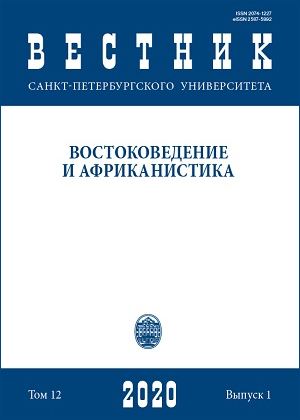Themes and Images in Liu Zhenyun’s Novel “Strange Bedfellows”
DOI:
https://doi.org/10.21638/spbu13.2020.105Abstract
The paper examines themes and images in the novel by Chinese writer Liu Zhenyun (b. 1958) “Strange Bedfellows” (2017), which on the one hand is an attempt to comprehend the interpersonal relationships and human existence in the era of technical progress, and, on the other, follows the tradition of spiritual quests in Chinese and world literature. The themes and images of the novel highlight a number of problems of modern Chinese society related to the cultural and ethnopsychological features of the Chinese nation. The fundamental theme of Liu Zhenyun’s new novel is the national character of the Chinese. Among Chinese writers, who brilliantly explored the subject, the contributions of Lu Xun (1881–1936), Lao She (1899–1966) and Lin Yutang (1895–1976) are the most significant. In the novel “Strange Bedfellows” Liu Zhenyun continues to ridicule the vices of his contemporaries. A distinctive feature of his work is the presence of an invisible, but ubiquitous crowd of Internet onlookers. The characters of the novel “Strange Bedfellows” are infected with a thirst for benefits. Shrewdness, mercantilism and deception run the show. Liu Zhenyun gives these traits to heroes of all social strata. There are no boundaries between positive and negative characters in his works. Besides, the writer considers the problem of corruption of the people and the authorities. On the one hand, it is revealed through the topics outlined above, and on the other — through the theme of the fight against corruption and luxurious lifestyle. The author makes it clear that the good intentions of the leadership to eradicate the phenomena of moral decay do not so much awaken good intentions in people, but rather trigger the mechanism of revenge. The system of snitching undermines the foundations of human nature and as a consequence, Liu Zhenyun addresses the problem of communication among the people. Reflecting on the challenges of the digital era and the prospects of Internet reality, Liu Zhenyun paints a picture of the consequences of moral disorientation of compatriots. Having inherited the literary tradition laid down by outstanding writers of the 20th century and developing the themes of his previous novels, the writer comes to the conclusion that new technologies aggravates the vices of the national character, which in the presence of the omnipresent virtual crowd provoke a herd mentality.
Keywords:
Liu Zhenyun, “Strange Bedfellows”, national character, Chinese literature
Downloads
References
Downloads
Published
How to Cite
Issue
Section
License
Articles of "Vestnik of Saint Petersburg University. Asian and African Studies" are open access distributed under the terms of the License Agreement with Saint Petersburg State University, which permits to the authors unrestricted distribution and self-archiving free of charge.





